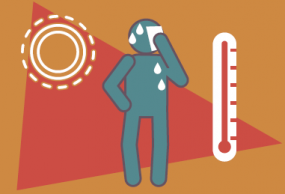Rhabdomyolysis
Who can get rhabdo?
Anyone can get rhabdo, but some workers are at a higher risk than others. People who work in hot environments and/or perform strenuous physical tasks have a higher chance of getting rhabdo. Some of these groups include:
- Firefighters (both structural and wildland)
- Police officers
- First responders
- People who work in hot environments, such as farm and construction workers or forge workers
- Military service members
- Athletes

It’s a common misconception that only unfit or out of shape people get rhabdo. But even people in great shape, such as firefighters, marathon runners, and professional athletes get rhabdo. It can happen to anyone and even after activities you have done in the past without a problem.

People who work outdoors in hot environments, in or near hot processes (such as forge or smelter workers, roofers, and asphalt pavers), or who wear personal protective equipment that can trap in body heat (like the heavy coats and pants structural firefighters wear) have a higher likelihood of developing rhabdo

People who work physically demanding jobs that involve high levels of physical exertion or participate in high intensity workouts or physical fitness tests have a greater chance of developing rhabdo.

Any work that could potentially result in traumatic injuries (such as falls from heights or car accidents) puts workers at a higher risk for rhabdo.
Other things that can increase your chances of developing rhabdo include:
- Using illegal drugs, such as cocaine and methamphetamine
- Excessive alcohol consumption
- Taking supplements, such as creatine and ephedra
- Consuming large amounts of caffeine or other stimulants
- Different infections, including flu, HIV, salmonella, staph, strep, and Epstein-Barr virus (mono)
- Certain medical conditions, such as uncontrolled diabetes, sickle cell disease, thyroid disorders, and muscular dystrophy
- Some medications, including some antibiotics, antidepressants, cholesterol-lowering drugs (statins), and cold and allergy medicines
